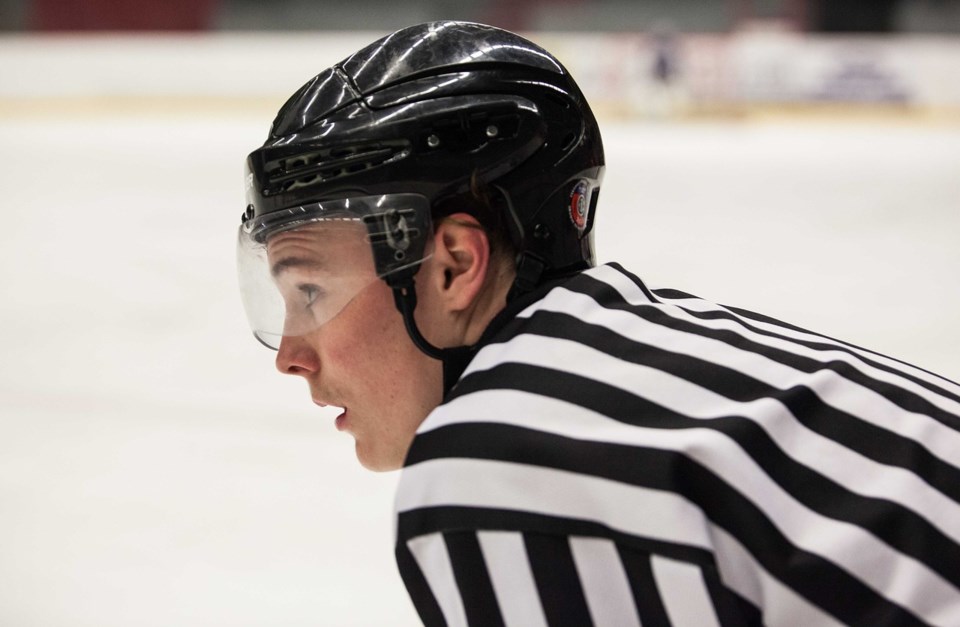From time to time, I write a story for this paper and it acts as a jumping off point for discussion. It’s almost never the stories you’d figure they’d be – the discussion is often unexpected.
We have one of those stories in this week’s issue, a short piece about Lauren Fox, a local hockey official who recently got a regional award from Hockey Manitoba. You can check the sports section if you want to see it (but do it after you’re done reading this, ok?).
After speaking with Lauren, I chatted with a few friends of mine who referee about why they do it and what they’ve seen. They all said the same thing – fewer kids are getting involved with officiating hockey.
I’m not shocked. We don’t exactly make hockey a welcoming place to be an official, after all. While the ref is one of the most important parts of organized minor hockey, kids don’t seem to want to put on the stripes. It’s not an easy job. It requires a keen and ever-expanding knowledge of the game and its rules, one that even the most ardent fans may not even have. It requires a sense of fairness, a strong belief in your own decisions and an inability to be swayed. Since numbers for new refs are not growing, the referees that are already there are overworked and overbooked. That’s tricky for 12-year-olds to deal with.
The biggest reason why officials quit or potential officials don’t pursue that path is verbal abuse. You get it from the players, you get it from the parents, from the coaches, from everyone in the rink not working the concessions or driving the Zamboni. I’ve played and watched enough hockey over the years to know that fans – especially those hockey parents we’ve all seen – can say absolutely vile things to kids who are overworked, underpaid and overburdened just so their kids can play a game.
Not everybody can take that. Nobody really should.
It’s easy to just say “sticks and stones” from a safe distance. After all, if you can’t take that treatment, why are you reffing?
We’re missing the point – why do refs have to go through that type of treatment at all? The problem isn’t with the refs. It’s with the peanut gallery yelling at them.
If you had a job offered to you and it involved someone swearing at you all day and perhaps threatening you or your family, I bet you wouldn’t take it. Imagine if, every time you made even a small mistake on the job, you had some angry dad with a windbreaker and a bright red high blood pressure face screaming bloody murder at you, leaning over the glass, maybe even trying to throw a punch.
This might sound like just a newspaper blowhard in 2019 being too sensitive, whining about a traditional part of hockey. Cry me a river – that is the reason why and there are numbers and studies to back that up.
Numbers from Hockey Canada show between a quarter and a third of all hockey officials leave the game every year. That amounts to hundreds of refs and linesmen each season.
Back in 2013, the Saskatoon Referees Association reported a drastic drop in their enrollment numbers in one offseason, going from more than 200 refs in 2012 to 160 in 2013. In a CBC interview with Darryl Cameron, now a zone officiating coordinator with the Saskatchewan Hockey Association, he said verbal abuse played a role in having kids either drop out of officiating or avoid it completely.
“I have a hard time sitting there and watching games because parents just start yelling and swearing for no reason. I mean these kids are out there doing their best, trying their best. [Parents] expect NHL referees, and I mean you are not going to get it. That is where, you know, you cut your teeth,” he said.
Cameron has reffed for about 40 years. I bet he knows what he’s talking about.
Dr. Kim Dorsch, a professor from my alma mater, the University of Regina, studied this subject years ago.
“There’s a crisis in officiating,” she said in the abstract of a study into why officials leave the game she released years ago. It still holds true.
“Attrition rates in most sports are high and the loss of qualified officials ends up having huge financial implications.”
Hating the ref is a Canadian tradition – but like many other Canadian traditions, it should be rethought. It makes little sense. In organized hockey, having a ref is almost as important as skates or a puck. Games are cancelled when refs don’t show up.
One of the refs I know is studying to become a police officer. Another is a wildland firefighter. The odds are good that they wouldn’t have developed the skills to be good at either of those jobs without the lessons they learned as officials.
Right now, the game needs new faces wearing the stripes. Older refs are leaving the game. Recruitment in many places isn’t enough to pick up the slack. Fewer refs means fewer games and no refs means no games.
My hat is off to refs. I’ll probably still second-guess your decisions and show frustration when you make a mistake, but I get it. Fans, players and parents need to remember there’s a human being with that whistle, just doing their job. Show a little sportsmanship and remember it’s just a game.
Maybe then, just maybe, we can get some more kids out wearing the stripes.




